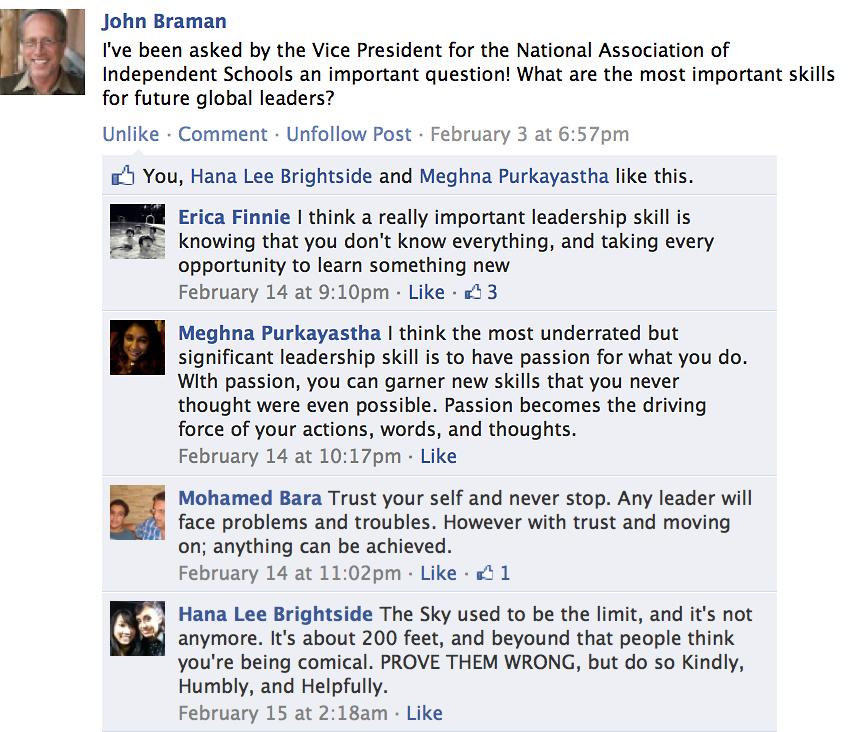March 7, 2013
Dear Friends,
I invited former students to share their thoughts about the status of global education. I’m always curious about what youth themselves have to say. Here’s a sample from Libya, New Zealand, California, and South Korea – all graduates of United World College’s “Global Leadership Forum” here in New Mexico.
1) What are the key 21st century skills?

2) What direction do I see my organization moving in the next 5-10 years?
I’m committed to finding more and more evidence for the importance of empathy, curiosity, compassion, and ethical bravery. Along with knowledge, capacities like these are vital to innovation, job creation, and a more peaceful world. It’s time to recognize our obsession with cognitive learning and preparing an obedient workforce for 1925.
3) What challenges do I think need to be overcome in order to further the spread of global education?
Last year, I asked this same question in the “Independent School Survey” of 140 schools in 17 countries on 5 continents: Argentina, Australia, Canada, Chile, Costa Rica, Denmark, England, Germany, Honduras, India, Kenya, Malaysia, Mexico, Spain, Switzerland, United States and United Arab Emirates.
The findings show that, in this time of extraordinary change, schools are finding new ways to enable youth to connect, collaborate, and create. This stage resembles other beachheads, such as diversity education and community service learning.
Click here to view the full survey
Here’s one question/response relating to the issue of capacities vs. skills:
“Some global education programs distinguish between the development of generic capacities and the development of skills and knowledge. For instance, a person’s ability to adapt to new conditions is a capacity, as are the ability to empathize or the ability to synthesize diverse viewpoints, On the other hand, knowing how to run a meeting in Mandarin involves acquired knowledge and skills. We are interested in your response to these different approaches to learning for high school students.”
| Most programs I know incorporate both approaches | 23.1% |
| Our students have plenty of skills and knowledge development; what they need is capacity development | 8.7% |
| I’d like to learn more about these different approaches | 47.1% |
| I don’t agree with this analysis of types | 12.5% |
4) How do we assess this kind of learning?
By having teacher/leaders ask, “What is school for?” more often. By incorporating demonstrations of learning in interdisciplinary ways. By applying scientific rigor to evaluation in nuanced ways, especially when the terms “experiential” and “global” are being used.
I wonder what you think. Is it true that the sky used to be the limit?
John Braman

 “As an executive for an American company working in South America to develop an artisan industry, I was beset
by stubborn implementation issues, cross-cultural
misunderstandings, and pressures for delivery from the
home office. John’s coaching helped me unravel the issues,
work across barriers of race and class, develop a learning
plan, and stick with it. I learned how to better manage my
boss. Eventually I left the company, but when I did, it was
with a clear direction that I have found very fulfilling.”
Oriana Nolan, Quito, Ecuador
“As an executive for an American company working in South America to develop an artisan industry, I was beset
by stubborn implementation issues, cross-cultural
misunderstandings, and pressures for delivery from the
home office. John’s coaching helped me unravel the issues,
work across barriers of race and class, develop a learning
plan, and stick with it. I learned how to better manage my
boss. Eventually I left the company, but when I did, it was
with a clear direction that I have found very fulfilling.”
Oriana Nolan, Quito, Ecuador
1 Response to 21st Century Skills – “The Sky Used To Be The Limit”